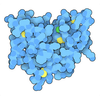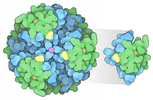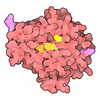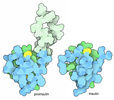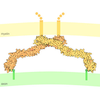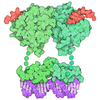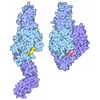[English] 日本語
 Yorodumi
Yorodumi- PDB-8pqw: Cytoplasmic dynein-1 motor domain bound to dynactin-p150glued and LIS1 -
+ Open data
Open data
- Basic information
Basic information
| Entry | Database: PDB / ID: 8pqw | ||||||||||||
|---|---|---|---|---|---|---|---|---|---|---|---|---|---|
| Title | Cytoplasmic dynein-1 motor domain bound to dynactin-p150glued and LIS1 | ||||||||||||
 Components Components |
| ||||||||||||
 Keywords Keywords | MOTOR PROTEIN / Dynein / AAA-Atpase / p150 / LIS1 | ||||||||||||
| Function / homology |  Function and homology information Function and homology informationmicrotubule cytoskeleton organization involved in establishment of planar polarity / ameboidal-type cell migration / establishment of planar polarity of embryonic epithelium / 1-alkyl-2-acetylglycerophosphocholine esterase complex / corpus callosum morphogenesis / centriolar subdistal appendage / maintenance of centrosome location / positive regulation of neuromuscular junction development / centriole-centriole cohesion / platelet activating factor metabolic process ...microtubule cytoskeleton organization involved in establishment of planar polarity / ameboidal-type cell migration / establishment of planar polarity of embryonic epithelium / 1-alkyl-2-acetylglycerophosphocholine esterase complex / corpus callosum morphogenesis / centriolar subdistal appendage / maintenance of centrosome location / positive regulation of neuromuscular junction development / centriole-centriole cohesion / platelet activating factor metabolic process / Regulation of PLK1 Activity at G2/M Transition / Loss of Nlp from mitotic centrosomes / Loss of proteins required for interphase microtubule organization from the centrosome / Anchoring of the basal body to the plasma membrane / AURKA Activation by TPX2 / transport along microtubule / radial glia-guided pyramidal neuron migration / acrosome assembly / central region of growth cone / Recruitment of mitotic centrosome proteins and complexes / microtubule anchoring at centrosome / cerebral cortex neuron differentiation / establishment of centrosome localization / microtubule sliding / dynein light chain binding / ventral spinal cord development / dynein heavy chain binding / positive regulation of cytokine-mediated signaling pathway / positive regulation of embryonic development / microtubule organizing center organization / interneuron migration / layer formation in cerebral cortex / retromer complex / microtubule plus-end / auditory receptor cell development / astral microtubule / nuclear membrane disassembly / cortical microtubule organization / positive regulation of intracellular transport / positive regulation of microtubule nucleation / positive regulation of dendritic spine morphogenesis / myeloid leukocyte migration / reelin-mediated signaling pathway / regulation of metaphase plate congression / positive regulation of spindle assembly / melanosome transport / establishment of spindle localization / osteoclast development / stereocilium / microtubule plus-end binding / non-motile cilium assembly / brain morphogenesis / vesicle transport along microtubule / dynein complex / retrograde transport, endosome to Golgi / COPI-independent Golgi-to-ER retrograde traffic / kinesin complex / retrograde axonal transport / HSP90 chaperone cycle for steroid hormone receptors (SHR) in the presence of ligand / MHC class II antigen presentation / P-body assembly / microtubule motor activity / Recruitment of NuMA to mitotic centrosomes / negative regulation of JNK cascade / microtubule associated complex / minus-end-directed microtubule motor activity / COPI-mediated anterograde transport / dynein light intermediate chain binding / cytoplasmic dynein complex / motile cilium / neuromuscular process controlling balance / microtubule-based movement / stem cell division / neuromuscular process / nuclear migration / neuromuscular junction development / germ cell development / cell leading edge / motor behavior / dynein intermediate chain binding / dynein complex binding / transmission of nerve impulse / dynactin binding / establishment of mitotic spindle orientation / protein secretion / cochlea development / neuroblast proliferation / positive regulation of axon extension / microtubule-based process / intercellular bridge / lipid catabolic process / COPI-mediated anterograde transport / phospholipase binding / cytoplasmic microtubule / JNK cascade / cytoplasmic microtubule organization / axon cytoplasm / Amplification of signal from unattached kinetochores via a MAD2 inhibitory signal / neuron projection maintenance / Loss of Nlp from mitotic centrosomes Similarity search - Function | ||||||||||||
| Biological species |  Homo sapiens (human) Homo sapiens (human) | ||||||||||||
| Method | ELECTRON MICROSCOPY / single particle reconstruction / cryo EM / Resolution: 4.2 Å | ||||||||||||
 Authors Authors | Singh, K. / Lau, C.K. / Manigrasso, G. / Gassmann, R. / Carter, A.P. | ||||||||||||
| Funding support |  United Kingdom, European Union, 3items United Kingdom, European Union, 3items
| ||||||||||||
 Citation Citation |  Journal: Science / Year: 2024 Journal: Science / Year: 2024Title: Molecular mechanism of dynein-dynactin complex assembly by LIS1. Authors: Kashish Singh / Clinton K Lau / Giulia Manigrasso / José B Gama / Reto Gassmann / Andrew P Carter /   Abstract: Cytoplasmic dynein is a microtubule motor vital for cellular organization and division. It functions as a ~4-megadalton complex containing its cofactor dynactin and a cargo-specific coiled-coil ...Cytoplasmic dynein is a microtubule motor vital for cellular organization and division. It functions as a ~4-megadalton complex containing its cofactor dynactin and a cargo-specific coiled-coil adaptor. However, how dynein and dynactin recognize diverse adaptors, how they interact with each other during complex formation, and the role of critical regulators such as lissencephaly-1 (LIS1) protein (LIS1) remain unclear. In this study, we determined the cryo-electron microscopy structure of dynein-dynactin on microtubules with LIS1 and the lysosomal adaptor JIP3. This structure reveals the molecular basis of interactions occurring during dynein activation. We show how JIP3 activates dynein despite its atypical architecture. Unexpectedly, LIS1 binds dynactin's p150 subunit, tethering it along the length of dynein. Our data suggest that LIS1 and p150 constrain dynein-dynactin to ensure efficient complex formation. | ||||||||||||
| History |
|
- Structure visualization
Structure visualization
| Structure viewer | Molecule:  Molmil Molmil Jmol/JSmol Jmol/JSmol |
|---|
- Downloads & links
Downloads & links
- Download
Download
| PDBx/mmCIF format |  8pqw.cif.gz 8pqw.cif.gz | 801.6 KB | Display |  PDBx/mmCIF format PDBx/mmCIF format |
|---|---|---|---|---|
| PDB format |  pdb8pqw.ent.gz pdb8pqw.ent.gz | 578.8 KB | Display |  PDB format PDB format |
| PDBx/mmJSON format |  8pqw.json.gz 8pqw.json.gz | Tree view |  PDBx/mmJSON format PDBx/mmJSON format | |
| Others |  Other downloads Other downloads |
-Validation report
| Arichive directory |  https://data.pdbj.org/pub/pdb/validation_reports/pq/8pqw https://data.pdbj.org/pub/pdb/validation_reports/pq/8pqw ftp://data.pdbj.org/pub/pdb/validation_reports/pq/8pqw ftp://data.pdbj.org/pub/pdb/validation_reports/pq/8pqw | HTTPS FTP |
|---|
-Related structure data
| Related structure data |  17826MC  8pqvC  8pqyC 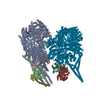 8pqzC  8pr0C  8pr1C 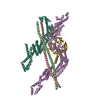 8pr2C  8pr3C  8pr4C 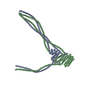 8pr5C  8ptkC M: map data used to model this data C: citing same article ( |
|---|---|
| Similar structure data | Similarity search - Function & homology  F&H Search F&H Search |
- Links
Links
- Assembly
Assembly
| Deposited unit | 
|
|---|---|
| 1 |
|
- Components
Components
-Cytoplasmic dynein 1 ... , 2 types, 3 molecules AHI
| #1: Protein | Mass: 533055.125 Da / Num. of mol.: 1 / Mutation: R1567E, K1610E Source method: isolated from a genetically manipulated source Source: (gene. exp.)  Homo sapiens (human) / Gene: DYNC1H1, DHC1, DNCH1, DNCL, DNECL, DYHC, KIAA0325 / Production host: Homo sapiens (human) / Gene: DYNC1H1, DHC1, DNCH1, DNCL, DNECL, DYHC, KIAA0325 / Production host:  |
|---|---|
| #4: Protein | Mass: 68442.141 Da / Num. of mol.: 2 Source method: isolated from a genetically manipulated source Source: (gene. exp.)  Homo sapiens (human) / Gene: DYNC1I2, DNCI2, DNCIC2 / Production host: Homo sapiens (human) / Gene: DYNC1I2, DNCI2, DNCIC2 / Production host:  |
-Protein , 2 types, 6 molecules BCDEFG
| #2: Protein | Mass: 46709.984 Da / Num. of mol.: 4 Source method: isolated from a genetically manipulated source Source: (gene. exp.)  Homo sapiens (human) / Gene: PAFAH1B1, LIS1, MDCR, MDS, PAFAHA / Production host: Homo sapiens (human) / Gene: PAFAH1B1, LIS1, MDCR, MDS, PAFAHA / Production host:  #3: Protein | Mass: 142015.484 Da / Num. of mol.: 2 / Source method: isolated from a natural source / Source: (natural)  |
|---|
-Non-polymers , 3 types, 6 molecules 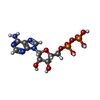

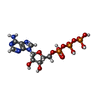


| #5: Chemical | | #6: Chemical | #7: Chemical | ChemComp-ATP / | |
|---|
-Details
| Has ligand of interest | Y |
|---|
-Experimental details
-Experiment
| Experiment | Method: ELECTRON MICROSCOPY |
|---|---|
| EM experiment | Aggregation state: PARTICLE / 3D reconstruction method: single particle reconstruction |
- Sample preparation
Sample preparation
| Component | Name: Cytoplasmic dynein-1 bound to dynactin p150 and LIS1 / Type: COMPLEX / Entity ID: #1-#4 / Source: RECOMBINANT |
|---|---|
| Source (natural) | Organism:  Homo sapiens (human) Homo sapiens (human) |
| Source (recombinant) | Organism:  |
| Buffer solution | pH: 7.2 |
| Specimen | Embedding applied: NO / Shadowing applied: NO / Staining applied: NO / Vitrification applied: YES |
| Vitrification | Cryogen name: ETHANE |
- Electron microscopy imaging
Electron microscopy imaging
| Experimental equipment |  Model: Titan Krios / Image courtesy: FEI Company |
|---|---|
| Microscopy | Model: FEI TITAN KRIOS |
| Electron gun | Electron source:  FIELD EMISSION GUN / Accelerating voltage: 300 kV / Illumination mode: FLOOD BEAM FIELD EMISSION GUN / Accelerating voltage: 300 kV / Illumination mode: FLOOD BEAM |
| Electron lens | Mode: BRIGHT FIELD / Nominal defocus max: 4000 nm / Nominal defocus min: 500 nm |
| Image recording | Electron dose: 53 e/Å2 / Film or detector model: GATAN K3 BIOQUANTUM (6k x 4k) |
- Processing
Processing
| EM software | Name: PHENIX / Version: 1.20_4459: / Category: model refinement | ||||||||||||||||||||||||
|---|---|---|---|---|---|---|---|---|---|---|---|---|---|---|---|---|---|---|---|---|---|---|---|---|---|
| CTF correction | Type: PHASE FLIPPING AND AMPLITUDE CORRECTION | ||||||||||||||||||||||||
| 3D reconstruction | Resolution: 4.2 Å / Resolution method: FSC 0.143 CUT-OFF / Num. of particles: 90594 / Symmetry type: POINT | ||||||||||||||||||||||||
| Atomic model building | PDB-ID: 7Z8G Accession code: 7Z8G / Source name: PDB / Type: experimental model | ||||||||||||||||||||||||
| Refine LS restraints |
|
 Movie
Movie Controller
Controller













 PDBj
PDBj

